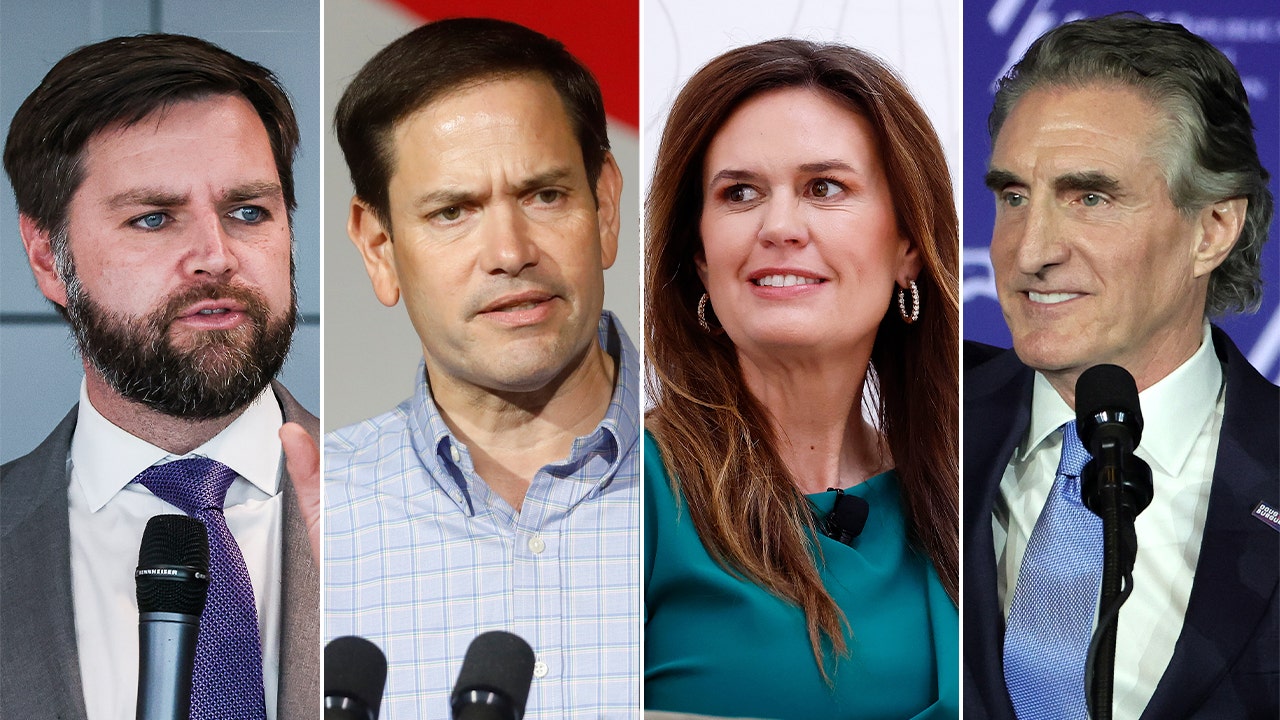New York
The Civil Fraud Ruling on Donald Trump, Annotated

Former President Donald J. Trump was penalized $355 million, plus millions more in interest, and banned for three years from serving in any top roles at a New York company, including his own, in a ruling on Friday by Justice Arthur F. Engoron. The decision comes after the state Attorney General Letitia James sued Mr. Trump, members of his family and his company in 2022.
The ruling expands on Justice Engoron’s decision last fall, which found that Mr. Trump’s financial statements were filled with fraudulent claims. Mr. Trump will appeal the financial penalty and is likely to appeal other restrictions; he has already appealed last fall’s ruling.
The New York Times annotated the document.
Download the original PDF.
New York Times Analysis
Next »
1
This ruling by Justice Arthur F. Engoron is a result of a 2022 lawsuit filed by New York’s attorney general, Letitia James, against Donald J. Trump and the Trump Organization; his adult sons, Donald Trump Jr. and Eric Trump; the company’s former chief financial officer Allen Weisselberg and former controller Jeffrey McConney; and several of their related entities. Mr. Trump’s daughter, Ivanka Trump, was also initially a defendant until an appeals court dismissed the case against her.


New York Times Analysis
« Previous Next »
2
The law under which Ms. James sued, known by its shorthand 63(12), requires the plaintiff to show a defendant’s conduct was deceptive. If that standard is met, a judge can impose severe punishment, including forfeiting the money obtained through fraud. Ms. James has also used this law against the oil company ExxonMobil, the tobacco brand Juul and the pharma executive Martin Shkreli.

New York Times Analysis
« Previous Next »
3
Justice Engoron is now providing a background of this case. This ruling comes after a three-year investigation by the attorney general’s office and the conclusion of a trial that ended last month. But this likely won’t be Mr. Trump’s last word on the matter — he will appeal the financial penalty and is likely to appeal other restrictions, as he has already appealed other rulings.
4
In late 2022, Justice Engoron assigned a former federal judge, Barbara Jones, to serve as a monitor at the Trump Organization and tasked her with keeping an eye on the company and its lending relationships. Last month, she issued a report citing inconsistencies in its financial reporting, which “may reflect a lack of adequate internal controls.”

New York Times Analysis
« Previous Next »
5
Here, Justice Engoron is laying out the laws he considered in his ruling beyond 63(12). The attorney general’s lawsuit included allegations of violations of falsifying business records, issuing false financial statements, insurance fraud and related conspiracy offenses.


New York Times Analysis
« Previous Next »
7
For over 50 pages, Justice Engoron describes his conclusions about the testimony of all of the witnesses who spoke during the trial.
















New York Times Analysis
« Previous Next »
8
Justice Engoron discusses Mr. McConney’s important role in preparing Mr. Trump’s financial statements. The judge points out that Mr. McConney prepared all the valuations on the statements in consultation with Mr. Weisselberg.



New York Times Analysis
« Previous Next »
9
In his discussion of Mr. Weisselberg, Justice Engoron calls his testimony in the trial “intentionally evasive.” Justice Engoron then brings up Mr. Weisselberg’s separation agreement from the Trump Organization, which prohibited him from voluntarily cooperating with any entities “adverse” to the organization. Justice Engoron says that this renders Mr. Weisselberg’s testimony highly unreliable.



New York Times Analysis
« Previous Next »
10
When Donald Trump Jr. testified in court, he disavowed responsibility for his father’s financial statements despite serving as a trustee of the Donald J. Trump Revocable Trust while his father was president. But Justice Engoron specifically cites here that Donald Trump Jr. certified that he was responsible for the financial statements, and testified that he intended for the banks to rely on them and that the statements were “materially accurate.”



New York Times Analysis
« Previous Next »
11
During his testimony, Eric Trump, the Trump Organization’s de facto chief executive, initially denied knowing about his father’s financial statements until this case. As Justice Engoron points out here, Eric Trump eventually conceded to knowing about them as early as 2013. As a result, Justice Engoron calls Eric Trump’s credibility “severely damaged.”


New York Times Analysis
« Previous Next »
12
Justice Engoron points to Mr. Trump’s testimony when he took the witness stand in November when Mr. Trump acknowledged that he helped put together his annual financial statements. Mr. Trump said he would see them and occasionally have suggestions.



New York Times Analysis
« Previous Next »
13
After four pages of describing Mr. Trump’s testimony, Justice Engoron says Mr. Trump rarely responded to the questions asked and frequently interjected long, irrelevant speeches, which all “severely compromised his credibility.”























New York Times Analysis
« Previous Next »
14
For more than a dozen pages, Justice Engoron provides background on specific assets that Mr. Trump included in his annual financial statements.















New York Times Analysis
« Previous Next »
15
The judge is clarifying that Ms. James had to prove her claims by a “preponderance of the evidence,” meaning she had to demonstrate it was more likely than not that Mr. Trump and the co-defendants should be held liable. This is a lower standard than that of a criminal trial, which requires that evidence be proven “beyond a reasonable doubt.”

New York Times Analysis
« Previous Next »
16
During the trial, Mr. Trump and his legal team tried to shift the blame for any inaccuracies in his financial statements onto his outside accountants. But Justice Engoron criticizes that argument here.

New York Times Analysis
« Previous Next »
17
During the monthslong trial, Mr. Trump, his legal team and several witnesses stressed that real estate appraisals are an art, not a science. But here it’s clear Justice Engoron, while agreeing with that sentiment, also believes it’s deceptive when different appraisals rely on different assumptions.

New York Times Analysis
« Previous Next »
18
Justice Engoron is now going through the defendants one by one and articulating the evidence that shows each of their “intent to defraud,” which is required by the statute against falsifying business records. Notably, his first paragraph describing the former president’s intent provides examples including Mr. Trump’s awareness that his triplex apartment was not 30,000 square feet and his valuation of Mar-a-Lago as a single-family residence even though it was deeded as a social club.



New York Times Analysis
« Previous Next »
19
Among the defendants, Justice Engoron finds only Allen Weisselberg and Jeffrey McConney liable for insurance fraud. Here, he doesn’t provide an explanation for why the other defendants, including Mr. Trump and his adult sons, were not found liable, and he says that both Mr. Weisselberg and Mr. McConney made false representations to insurance companies about Mr. Trump’s financial statements.
20
While Mr. Trump and his adult sons were not found liable for insurance fraud, here Justice Engoron finds them liable for conspiracy to commit insurance fraud, explaining that they all “aided and abetted” the conspiracy to commit insurance fraud by falsifying business records.

New York Times Analysis
« Previous Next »
21
Justice Engoron here adopts the approximations of the attorney general’s expert witness Michiel McCarty, whom Justice Engoron says testified “reliably and convincingly,” and finds that the defendants’ fraud saved them over $168 million in interest.

New York Times Analysis
« Previous Next »
22
In finding that the defendants were able to purchase the Old Post Office in Washington, D.C., through their use of the fraudulent financial statements, Justice Engoron rules that the defendants’ proceeds from the sale of the post office in 2022 should be considered “ill-gotten gains.” He penalizes Donald Trump and his companies over $126 million, and Donald Trump Jr. and Eric Trump $4 million each, for this one property.




New York Times Analysis
« Previous Next »
23
Justice Engoron blasts the defendants for failing to admit that they were wrong in their valuations — adding that “their complete lack of contrition and remorse borders on pathological.” He says that this inability to admit error makes him believe they will continue their fraudulent activities unless “judicially restrained.”

New York Times Analysis
« Previous Next »
25
Justice Engoron states that Judge Barbara Jones, who has been serving as an independent monitor at the Trump Organization since 2022, will continue in that role for at least three years. He clarifies that going forward, her role will be enhanced and she will review Trump Organization financial disclosures before they are submitted to any third party, to ensure that there are no material misstatements.

New York Times Analysis
« Previous Next »

New York Times Analysis
« Previous Next »
27
Justice Engoron lays out his bans against the defendants, ruling that Mr. Trump, Mr. Weisselberg and Mr. McConney cannot serve as officers or directors of any corporation or legal entity in New York for the next three years, and bans his sons Donald Trump Jr., and Eric Trump for two years from the same. He also prohibits Mr. Trump from applying for any loans from any New York banks for the next three years. The ruling goes further in the cases of Mr. Weisselberg and Mr. McConney, permanently barring them from serving in the financial control function of any New York business.

New York Times Analysis
« Previous
28
Justice Engoron also ordered that Mr. Trump and his sons pay the interest, pushing the penalty to $450 million, according to Ms. James.


New York
Transcript of Trump Manhattan Trial, May 14, 2024

Proceedings
SUPREME COURT
CRIMINAL TERM
NEW YORK COUNTY
PART 59
THE PEOPLE OF THE STATE OF NEW YORK
-against
DONALD J. TRUMP,
Defendant.
:
3503
INDICTMENT #
71543/2023
Falsifying Business
Records First Degree
BEFORE:
100 Centre Street
New York, New York 10013
May 14, 2024
HONORABLE JUAN M. MERCHAN,
JUSTICE OF THE SUPREME COURT
APPEARANCES:
FOR THE PEOPLE:
ALVIN L. BRAGG, JR., ESQ.
New York County District Attorney
BY: JOSHUA STEINGLASS, ESQ.,
MATTHEW COLANGELO, ESQ.,
SUSAN HOFFINGER, ESQ.,
CHRISTOPHER CONROY, ESQ.,
REBECCA MANGOLD,
ESQ.,
KATHERINE ELLIS, ESQ.,
Assistant District Attorneys
FOR THE DEFENDANT:
BLANCHE LAW
BY: TODD BLANCHE, ESQ.
EMIL BOVE, ESQ.
KENDRA WHARTON, ESQ.
STEPHEN WEISS, ESQ.
NECHELES LAW, LLP
BY: SUSAN NECHELES, ESQ.
GEDALIA STERN, ESQ.
SUSAN PEARCE-BATES
Principal Court Reporter
LAURIE EISENBERG, RPR, CSR
LISA KRAMSKY
THERESA MAGNICCARI
Senior Court Reporters
Lisa Kramsky,
Senior Court Reporter
New York
Transcript of Trump Manhattan Trial, May 13, 2024

M. Cohen Direct/Hoffinger
3277
1
was there at The Trump Organization about executives coming in
2
to meet with Mr. Trump?
3
A
Mr.
Trump had an open-door policy, which, if there was
4
5
6
somebody in there, you waited; and if not, you knocked on the
door, and I would say, “Boss, do you have a second?”, and I
would walk right in.
7
Q
And others did the same, to your knowledge?
8
A
9
To my knowledge, yes.
Now, when you met with Mr. Trump at The Trump
Organization, in his office, did you, generally, need
10
–
I’m
11
sorry.
12
Did you, generally, record those meetings in your calendar?
13
A
No, ma’am.
14
15
16
As part of your work at The Trump Organization, did
you feel that it was part of your job to keep him updated on
matters that you were handling for him?
17
A
Yes.
It was actually required.
18
19
20
21
22
23
A
Tell us what you mean by that.
When he would task you with something, he would then
say, “Keep me informed. Let me know what’s going on.”
And what he was saying, what everybody did is, as soon as
you had a result, an answer, you would go straight back and
tell him. Especially if it was a matter that was troubling to
24
him.
25
So, two things, just to break that down.
Laurie Eisenberg, CSR, RPR
Senior Court Reporter
New York
Video: Michael Cohen Says Trump Discussed Reimbursement in Oval Office

Michael Cohen’s story of a hush-money arrangement struck in the White House was the only personal account tying Donald J. Trump to falsified documents. Jonah Bromwich, a criminal justice reporter at The New York Times, gives his takeaways.
-

 Finance1 week ago
Finance1 week agoSpring Finance Forum 2024: CRE Financiers Eye Signs of Recovery
-

 World1 week ago
World1 week agoIndia Lok Sabha election 2024 Phase 4: Who votes and what’s at stake?
-

 Politics1 week ago
Politics1 week agoBiden’s decision to pull Israel weapons shipment kept quiet until after Holocaust remembrance address: report
-

 News1 week ago
News1 week agoTornadoes tear through the southeastern U.S. as storms leave 3 dead
-

 News1 week ago
News1 week agoThe Major Supreme Court Cases of 2024
-

 World1 week ago
World1 week agoA look at Chinese investment within Hungary
-

 Politics1 week ago
Politics1 week agoTales from the trail: The blue states Trump eyes to turn red in November
-

 World1 week ago
World1 week agoBorrell: Spain, Ireland and others could recognise Palestine on 21 May














